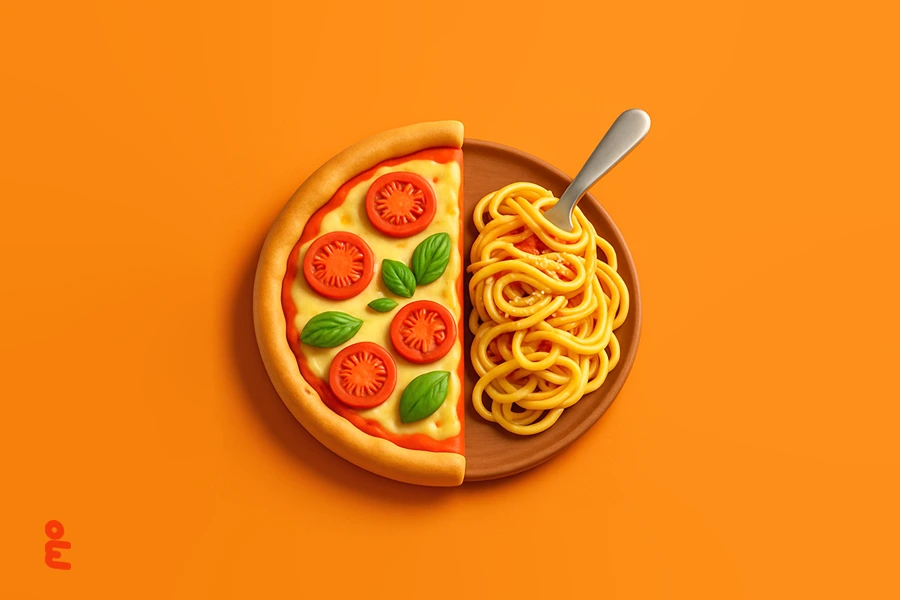Italian Food Quiz: Mamma Mia or Mamma No?

You’re in a cozy Roman osteria, the waiter brings the menu, and there’s… silence in your head. Carbonara, cacio e pepe, saltimbocca – beautiful words, but what lies behind them? If you think spaghetti Bolognese is a classic of Italian cuisine, prepare for a shock. Our quiz will ruthlessly separate true connoisseurs from those who discovered Italy through mall pizzerias. 15 questions, 15 chances to prove that your love for Italian cuisine isn’t just words, but a deep understanding of an entire nation’s gastronomic soul.
Italian Cuisine – The Art That Conquered the World
Italian cuisine isn’t just food – it’s a manifesto of life. In a world where fast food dictates the rhythm, Italians stubbornly stretch lunch to two hours, transforming mealtime into a sacred ritual. This is a cuisine built on paradoxes: the simplest ingredients create the most complex flavors, the strictest rules combine with boundless creativity, and local patriotism coexists with global recognition.
The phenomenon of Italian gastronomy lies in the concept of “cucina povera” – peasant cuisine that became luxury for gourmets. Pasta with olive oil and garlic, which fed farmers, is now served in Michelin-starred restaurants. Pizza, street food for Neapolitan workers, has conquered all continents. But it’s precisely in this simplicity that complexity hides: try making the perfect carbonara from four ingredients, and you’ll understand why Italian chefs study for years.
The secret of global success lies in the philosophy of “fare bella figura” (making a good impression), which permeates the entire culture. Every dish is a performance where not only taste matters, but also presentation, history, emotions. Italians don’t just cook – they tell stories through food, pass down traditions, express love. This is why pasta al dente isn’t just a cooking method, but a philosophical statement about the proper balance between softness and firmness, between compliance and character.
Regional Diversity of Italy and Its Reflection in Quiz Questions
Forget about “Italian cuisine” as a unified concept – it’s a myth created for foreigners’ convenience. In reality, there are 20 regional cuisines, each with its own character, history, and irreconcilable beliefs. A Milanese will look at you with bewilderment if you order Parmesan with risotto instead of Grana Padano. A Neapolitan will fly into a rage over pineapple on pizza. And a Roman… a Roman will simply shrug and say that everyone except Romans are barbarians.
This phenomenon is called “campanilismo” – from the word “campanile” (bell tower). Every village considers its bell tower the center of the universe, and its recipes the only correct ones. In Bologna, the recipe for tagliatelle is officially registered (8mm width, no more and no less!). In Naples, there’s an association for protecting authentic pizza with an 11-page regulation. Genoese are ready to fight for the honor of their pesto, and Sicilians – for the correct rice proportion in arancini.
Our quiz immerses you in this delightful regional war. The questions are designed to test not just knowledge of dishes, but understanding of cultural context. Do you know why carbonara in Rome is made with guanciale, not pancetta? Do you understand the difference between Parma and San Daniele ham? Can you distinguish Ligurian focaccia from Apulian? Every correct answer is a step toward understanding the Italian soul.
Quiz Objective: Test Your Erudition in Italian Gastronomy
This quiz is a cultural immersion, an intellectual adventure, and possibly a painful discovery of how little we know about a cuisine we consider familiar. 15 questions cover everything: from the history of dish origins to the subtleties of regional differences, from rules of ingredient pairing to culinary etiquette.
The quiz is built on the principle of increasing difficulty. The first questions will test basic knowledge – what any self-respecting Italian cuisine lover should know. But then the real trial begins. You’ll learn about dishes you won’t find in tourist restaurants, about traditions kept only by locals, about subtleties that distinguish a dilettante from a connoisseur.
Why exactly 15/15? Because in Italian culture, there’s no place for compromise. Either you do everything right, or you don’t do it at all. 14 out of 15 is like undercooked pasta or over-roasted coffee: close, but everything’s ruined. Only by achieving the maximum score can you proudly say: “Io sono un vero intenditore” – I am a true connoisseur.
Levels of Italian Cuisine Knowledge Determined by the Quiz
The quiz divides participants into four categories – from casual tourists to honorary Italians. Each level reflects not just the number of correct answers, but the depth of understanding of the culture behind the dishes. Find out which level of gastronomic enlightenment you’re at.
Tourist Level (0-5 correct answers)
You know Pizza Margherita and spaghetti carbonara, but your knowledge is limited to international chain menus. Don’t be discouraged – you have a wonderful opportunity to discover the real Italy. Start by studying regional features and dish histories.
Amateur Level (6-10 correct answers)
You’re clearly more interested in Italian cuisine than average. Perhaps you’ve been to Italy or read cookbooks. You know the main regional dishes and understand the importance of quality ingredients. The next step is to delve deeper into cooking subtleties and cultural context.
Advanced Level (11-14 correct answers)
Bravo! You’re almost at the goal. Your knowledge is impressive – you distinguish regional nuances, know dish histories, and understand Italian cuisine philosophy. Those few questions that stumped you likely concerned very specific details. A little more effort, and you’ll achieve perfection.
“Honorary Italian” Level (15/15 correct answers)
Mamma mia! You’re either an Italian hiding your origins, or a true expert. Your knowledge goes beyond simple erudition – you understand the soul of Italian cuisine, feel its rhythms, know its secrets. You can confidently lead gastronomic tours of Italy or open an authentic restaurant.
Italian Culinary Terms: A True Gourmet’s Dictionary
Language is the key to understanding culture, and Italian gastronomy confirms this. Every term carries history, philosophy, a way of thinking. “Al dente” isn’t just “to the tooth,” it’s an entire concept of proper texture, balance between doneness and structure preservation. “Mantecatura” isn’t just stirring, it’s the magical moment when separate ingredients transform into a unified creamy whole.
Understanding terminology opens doors to the world of authentic Italian cuisine. “Soffritto” isn’t just sautéing vegetables, it’s the flavor foundation on which the entire dish is built. “Risottare” is the meditative process of making risotto, requiring constant attention and love. “Spadellare” is the art of tossing pasta in a pan, which transforms a simple dish into a culinary masterpiece.
Our quiz will test how deeply you understand these terms. Do you know the difference between “battuto” and “trito”? Do you understand why “scarpetta” is the highest compliment to a chef? Can you explain what “quanto basta” is and why it’s the most Italian measure of all?
Studying Italian culinary terms isn’t just expanding vocabulary. It’s immersion into the mentality of a people for whom food is a language of love, an art of living, and a way of preserving identity in a globalized world. Every word is a small window into the Italian soul, and our quiz will help you open these windows wider.
Ready to test your knowledge? Remember: there are no random questions in this quiz. Each one is an invitation to dive deeper into the amazing world of Italian gastronomy. Buona fortuna!
Questions Overview 🧠
- Pancetta
- Guanciale
- Bacon
- Prosciutto
- Spaghetti
- Rigatoni
- Tonnarelli
- Fettuccine
- Tuscany
- Lazio
- Lombardy
- Piedmont
- Small portion
- Using bread to soak up sauce
- Quick meal
- Chef's special
- Gorgonzola
- Pecorino Sardo
- Mozzarella
- Ricotta
- 60 seconds
- 90 seconds
- 3 minutes
- 5 minutes
- Putting ice in wine
- Cappuccino after 11 AM
- Breaking spaghetti before cooking
- All of the above
- 5mm
- 8mm
- 10mm
- 12mm
- Panna cotta
- Cannoli
- Tiramisu
- Zabaglione
- June
- July
- August
- September
- Marinating meat
- The final creaming process in risotto
- Kneading pizza dough
- Reducing sauce
- Radiatori
- Tripoline
- Campanelle
- Conchiglie
- 3
- 4
- 5
- 6
- Naples
- Milan
- Venice
- Florence
- Quarter cup
- As much as needed
- Quick boil
- Quality base






